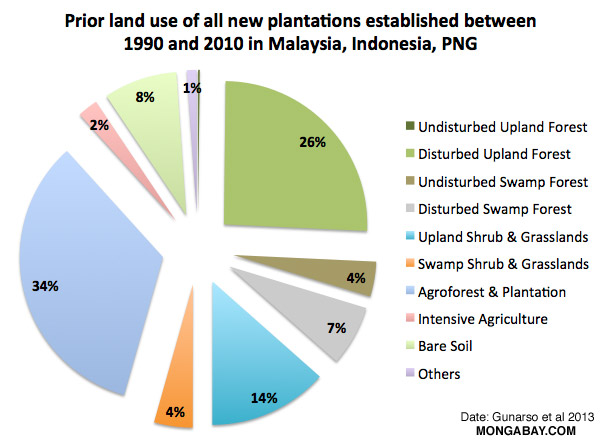
Deforestation for palm oil production in Malaysia
A group of environmental activists, conservation groups, and palm oil producers officially announced a new initiative that aims to showcase best practices in the palm oil industry, demonstrating that palm oil can be produced without social conflict, conversion of peatlands, or destruction of wildlife-rich forests.
The Palm Oil Innovation Group (POIG), as the group is known, unveiled its standards during the annual meeting of the Roundtable on Sustainable Palm Oil (RSPO), the industry’s main certification body. The standards build on criteria set by the RSPO by adding stricter requirements “to ensure that there is a supply of traceable palm oil free from forest and peatland destruction and human rights abuses,” according to a statement from Greenpeace, one of POIG’s charter members.
“It builds a business case for responsible palm oil by bridging the gap between palm oil producers and palm oil consumer companies such as Nestle, and more recently Ferrero and Unilever, which have made ‘No Deforestation’ commitments,” the activist group added.
In addition to Greenpeace, POIG includes Agropalma, a Brazilian producer; DAABON, a Colombian producer; New Britain Palm Oil, a producer in Papua New Guinea; WWF, the Rainforest Action Network (RAN), and the Forest Peoples Programme. Notably, neither Greenpeace nor RAN are RSPO members, while WWF is one of the RSPO’s biggest champions.
According to organizers, POIG aims to pull the RSPO toward stronger standards rather than replace the certification standard.
“POIG is meant to strengthen, not undermine, the RSPO,” said RAN.

Land conversion for oil palm plantations, 1990-2010, in Borneo, Sumatra, New Guinea, and Peninsular Malaysia. Data from Gunarso et al 2013.
The pull would come from demand from companies that want to avoid some of the negative associations with some palm oil production, which over the past decade has emerged as one of the fast-growing drivers of deforestation and greenhouse gas emissions from land use. Oil palm expansion has also been linked to land grabbing and social conflict in some regions, including Sarawak, Indonesia, West Africa, and Colombia, among others.
“The palm oil industry has suffered from a bad reputation from its association with forest destruction and exploitation. We are building a strong case that palm oil does not need to be linked to forest destruction and exploitation. From producers and traders, through to palm oil consumers, we are creating an approach that can be replicated across the industry, and which will increase demand for responsible palm oil,” said Greenpeace.
“Our intention is to build on the RSPO’s standards and commitments by demonstrating innovation and encouraging producers, NGOs and other stakeholders to support and sign onto the charter. Together, we will explore ways to increase the market demand for traceable and responsible palm oil products, and engage with governments and the industry to make this a reality.”
The initiative comes at a time when there are rumblings from some major Malaysian and Indonesian palm oil companies RSPO criteria have become too onerous and aren’t providing a sufficient premium for their product, which is mostly consumed in markets that show little preference for environmental performance: China, India, Pakistan, Bangladesh, and Indonesia. A group of Malaysian producers is said to be threatening to defect from the voluntary certification standard. They would instead rely on a new, less stringent standard set mandated by the Malaysian government, potentially driving a wedge in the market for certified palm oil.